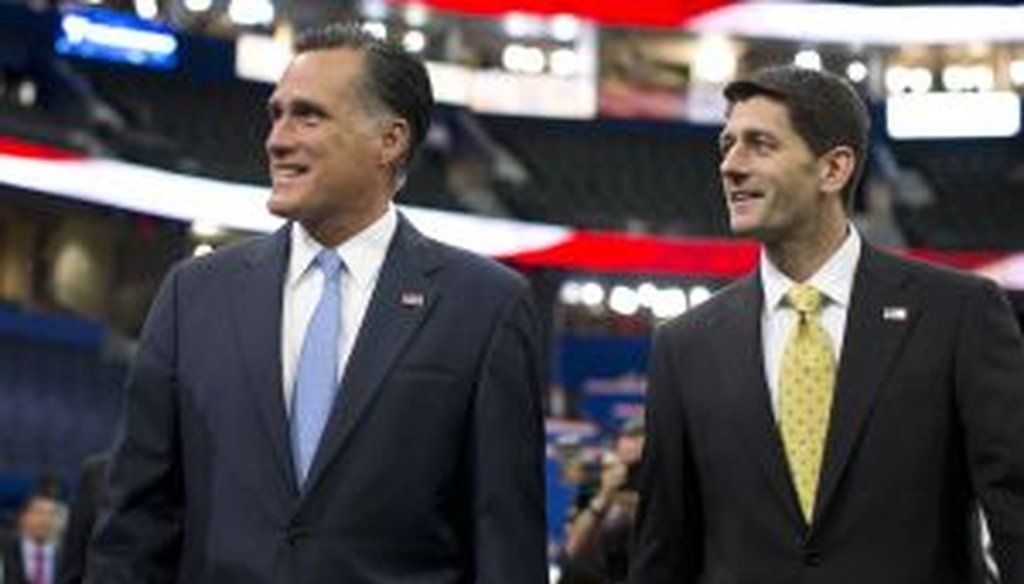Get PolitiFact in your inbox.

Mitt Romney and Paul Ryan did a walk-through of the convention hall on Aug. 30.
For a Republican National Convention that began with the unveiling of a ceremonial debt clock, Paul Ryan’s charge was a doozy.
During his acceptance speech, the GOP’s vice presidential nominee pinned blame squarely on President Barack Obama for the unraveling of a presidentially appointed deficit commission chaired by Democrat Erskine Bowles and Republican Alan Simpson.
"In this generation, a defining responsibility of government is to steer our nation clear of a debt crisis while there is still time," Ryan said in his Aug. 29 speech in Tampa. "Back in 2008, candidate Obama called a $10 trillion national debt ‘unpatriotic’ – serious talk from what looked to be a serious reformer. Yet by his own decisions, President Obama has added more debt than any other president before him, and more than all the troubled governments of Europe combined. One president, one term, $5 trillion in new debt.
"He created a bipartisan debt commission," Ryan continued, "They came back with an urgent report. He thanked them, sent them on their way, and then did exactly nothing. Republicans stepped up with good-faith reforms and solutions equal to the problems. How did the president respond? By doing nothing – nothing except to dodge and demagogue the issue."
Ryan’s comments, though, had a striking omission: He voted against the commission’s proposal.
As chairman of the House Budget Committee, Ryan was on the bipartisan panel and was one of the seven members who voted against the final recommendation.
Given the spotlight Ryan cast on this episode during his high-profile Tampa address, we thought we’d recap what happened with the Simpson-Bowles commission and Ryan’s role in it.
The National Commission on Fiscal Responsibility and Reform, established by presidential order in February 2010, included 18 members, split between Democratic and Republican appointees. In December 2010, the commission released its final report, which included dozens of proposals to cut discretionary spending, reform the tax code and Social Security and rein in health care costs, among other measures.
To have the proposal sent to Congress for a vote, 14 out of 18 members had to vote yes.That didn’t happen, because in the end, only 11 members supported it.
Three of the "no" votes were liberals: Democratic Reps. Xavier Becerra of California and Jan Schakowsky of Illinois, plus Andy Stern, former president of the Service Employees International Union. One was a more moderate Democrat, Senate Finance Committee chairman Max Baucus of Montana. And three were conservative Republicans, all from the U.S. House of Representatives: Ways and Means chairman Dave Camp, Rep. Jeb Hensarling of Texas and Ryan.
The members’ rationales for voting no ranged from taxes to Social Security to federal spending -- either too much or too little, depending on the dissent in question.
In his official statement, Ryan praised aspects of the proposal, saying that while "I could not support the plan in its entirety, many of its elements surely are worthy of further pursuit."
On the downside, though, Ryan cited a failure to do enough to reduce future health care costs, as well as its approach to taxes, as reasons to vote against it. "Their proposal is a serious and credible plan, but I cannot support it," he said at the time.
On health care, Ryan said a vote for the report would advance the new Obama health care law, which he and other Republicans opposed. "My primary concern with this plan is health care," Ryan said at a news conference with other members of the panel. "I do not believe that this sufficiently fixes the health care problem. And, guess what, our debt problem is the health care problem."
He elaborated in a news release, "This plan not only lacks needed structural reforms, but would in fact take us in the wrong direction on health care by accelerating the adverse consequences of the president’s health care law."
Meanwhile, on taxes, Ryan said the plan "relies too heavily on revenue increases. … Increasing the government’s take from the economy hinders growth."
Ryan’s camp says he worked to find a bipartisan solution before the final vote was taken, joining with Alice Rivlin, a Democratic former director of the Office of Management and Budget, to offer an alternative plan that would have converted Medicaid, the state-federal health plan for the poor, into a block grant for states. But Democrats on the commission "opposed the plan and it was dropped," according to the Capitol Hill newspaper Roll Call.
So how important was Ryan’s decision not to vote for the proposal? Quite important, said several budget policy experts we contacted for this story.
Steve Ellis -- whose group, Taxpayers for Common Sense, criticized Obama for not getting behind Simpson-Bowles -- said "it is certainly fair" for Ryan to criticize Obama on his handling of the issue.
But Ellis added that Ryan in his speech "conveniently ignored his role in Simpson-Bowles not going forward. The House Republicans voted as a bloc -- they were the only ones to vote as a bloc, and I think that was its undoing. They voted to oppose it because it didn’t repeal Obamacare, which to me seemed more like an excuse for the vote against it when they had already made up their minds to oppose it. … I don’t know if Rep. Ryan was the ringleader of the group, but he certainly was the most visible and well known."
Other budget specialists we contacted were even less charitable toward Ryan’s framing of the issue in Tampa.
"‘They?’ ‘Them?’ Why didn't he say, ‘us?’" said Roy T. Meyers, a budget expert who teaches political science at the University of Maryland-Baltimore County. "His speech can be judged using Orwellian standards. It's beyond hypocritical. It's repeatedly and cynically dishonest."
Norm Ornstein, a scholar at the conservative American Enterprise Institute, agreed.
"I found it utterly hypocritical, and it was at a minimum disingenuous not to mention his membership on the commission," Ornstein said. "The reality is that the three House Republicans who voted against it, unlike the Senate Republicans, were instrumental in keeping the plan from coming directly to Congress. They were not alone, to be sure, since they were joined by some House Democrats, and the president deserves chastisement for not endorsing at least the plan's structure in the subsequent State of the Union.
"But the fact is that John Spratt (the top Democrat on the House Budget Committee) voted for the plan, and one of the other House Democrats on the Commission, Xavier Becerra, subsequently indicated a willingness to act on entitlement reforms, while none of the three House Republicans were willing to budge on taxes."
And Stan Collender, a former Democratic staff member of the House and Senate Budget Committees, said that the "primary reason" the plan didn’t advance was that Ryan and Camp "indicated that they were against it. If they had supported it, or at least allowed it to move forward, there is a very good likelihood that the plan would have been approved and that a deficit reduction deal would have been reached."
To Collender, Ryan blaming Obama for the commission’s failure is "disingenuous, misleading and the worst form of hypocritical politics. It’s the political equivalent of killing your parents and then begging the court for mercy because you’re an orphan."
Our Sources
Paul Ryan, speech to the Republican National Convention in Tampa, Aug. 29, 2012
National Commission on Fiscal Responsibility and Reform, transcript of news conference, Dec. 1, 2010 (CQ subscribers only)
National Commission on Fiscal Responsibility and Reform, official statements of members, Dec. 1, 2010
Paul Ryan, "Ryan Statement on Success of Fiscal Commission; Opposition to Co-Chairs’ Proposal," Dec. 2, 2010
New York Times, "In a 11-7 Tally, the Fiscal Commission Falls Short on Votes," Dec. 3, 2010
PolitiFact, "John Boehner says Obama ‘took exactly none of his own deficit reduction commission’s ideas,'" April 28, 2011
PolitiFact, "Jon Huntsman says President Barack Obama threw deficit reduction plan 'in the garbage can,'" Jan. 8, 2012
Roll Call, "Debt Panel Punted on Health Care Cost Plan," Dec. 9, 2010
Email interview with Norman Ornstein, senior fellow with the American Enterprise Institute, Aug. 30, 2012
Email interview with Roy T. Meyers, political scientist at the University of Maryland-Baltimore County, Aug. 30, 2012
Email interview with Stan Collender, partner at Qorvis, Aug. 30, 2012
Email interview with Steve Ellis, vice president of Taxpayers for Common Sense, Aug. 30, 2012




































